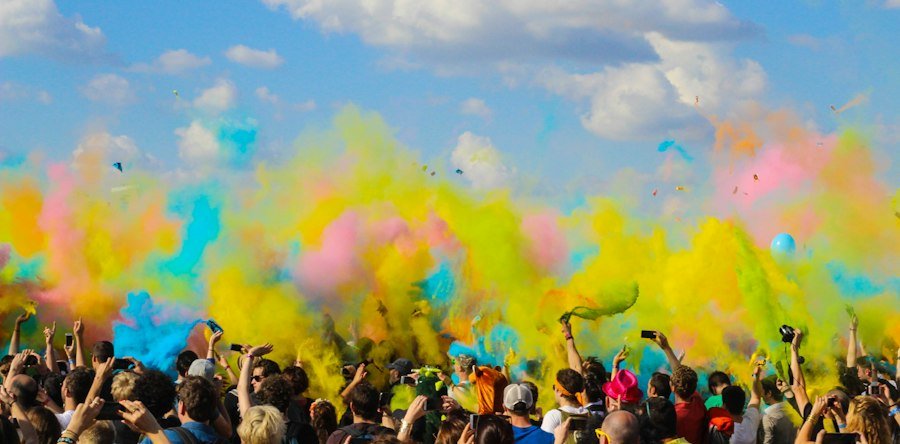

How to Talk About Festivals in Spanish: 25 Cultural Terms
Festivals hold a special place in Spanish culture, as they are a time for celebration, community, and tradition. From small village fiestas to large-scale national events, festivals are an integral part of Spanish life. They provide an opportunity for people to come together, honor their heritage, and showcase their unique customs and traditions.
One of the remarkable aspects of festivals in Spanish-speaking countries is their diversity. Each region has its own unique festivals, often rooted in local history and traditions. For example, in Catalonia, the region of Spain where Barcelona is located, there is the famous festival of La Mercè, which celebrates the patron saint of Barcelona. In Andalusia, the southern region of Spain, the Feria de Abril is a week-long celebration of music, dance, and traditional dress. In Mexico, Dia de los Muertos (Day of the Dead) is a vibrant and colorful festival that honors deceased loved ones.
Table of Contents
ToggleKey Takeaways
- Spanish festival culture is rich and diverse, with a wide range of traditional celebrations throughout the year.
- Learning essential vocabulary related to festivals in Spanish is key to understanding and participating in these cultural events.
- Traditional festivals in Spain include La Tomatina, Las Fallas, and La Feria de Abril, each with their own unique customs and traditions.
- Religious festivals, such as Semana Santa and Dia de los Muertos, are important cultural events in Spanish-speaking countries.
- Food and drink play a significant role in Spanish festival culture, with traditional dishes and drinks often associated with specific celebrations.
Essential Vocabulary for Discussing Festivals in Spanish
To fully immerse yourself in Spanish festival culture, it’s important to have a basic understanding of the vocabulary related to festivals. Here are some common words and phrases you may encounter:
– Fiesta: Party or celebration
– Desfile: Parade
– Baile: Dance
– Música: Music
– Disfraces: Costumes
– Comida: Food
– Bebidas: Drinks
– Tradición: Tradition
– Cultura: Culture
When pronouncing these words, it’s important to pay attention to the accent marks and pronunciation rules in Spanish. For example, the word “fiesta” is pronounced as “fee-es-ta” with the emphasis on the second syllable. Similarly, “baile” is pronounced as “bye-le” with the emphasis on the first syllable.
Traditional Festivals in Spain: A Brief Overview
Spain is known for its vibrant and lively festivals, many of which have deep historical and cultural significance. One of the most famous festivals in Spain is La Tomatina, held in the town of Buñol near Valencia. During this festival, participants engage in a massive tomato fight, covering the streets in a sea of red. La Tomatina attracts thousands of tourists from around the world who come to experience this unique and exhilarating event.
Another iconic festival in Spain is the Feria de Abril, held in Seville. This week-long celebration is a showcase of Andalusian culture, featuring flamenco dancing, traditional dress, and horse parades. The streets are filled with colorful tents where people gather to eat, drink, and dance the night away.
Celebrating Religious Festivals in Spanish-Speaking Countries
Religion plays a significant role in Spanish-speaking countries, and many festivals are centered around religious holidays and traditions. Semana Santa (Holy Week) is one of the most important religious festivals in Spain, particularly in cities like Seville and Malaga. During Semana Santa, processions take place throughout the week, with participants carrying religious statues through the streets.
In Mexico, Dia de los Muertos (Day of the Dead) is a unique and vibrant festival that honors deceased loved ones. Families create elaborate altars adorned with photographs, candles, and marigolds to welcome the spirits of their ancestors. The festival is a celebration of life and death, with colorful parades, music, and traditional foods.
The Importance of Food and Drink in Spanish Festival Culture
Food and drink are an essential part of Spanish festival culture. Festivals provide an opportunity for people to indulge in traditional dishes and drinks that are often associated with specific celebrations. For example, during La Tomatina, participants may enjoy paella, a traditional Spanish rice dish that originated in Valencia. In Andalusia, the Feria de Abril is known for its tapas, small plates of various foods that are perfect for sharing and sampling.
Drinks also play a significant role in Spanish festivals. Sangria, a refreshing wine-based cocktail, is a popular choice during summer festivals. In Catalonia, cava, a sparkling wine similar to champagne, is often enjoyed during celebrations. It’s important to note that in Spain, it is common to have a glass of wine or beer with meals, even during festivals.
Music and Dance in Festivals: Common Terms and Phrases

Music and dance are integral parts of Spanish festivals, adding to the lively and festive atmosphere. Here are some common terms and phrases related to music and dance:
– Flamenco: A traditional Spanish dance characterized by its passionate and expressive movements.
– Sevillanas: A type of flamenco dance that originated in Seville.
– Rumba: A lively dance style with Afro-Cuban origins.
– Pasodoble: A traditional Spanish dance often performed during bullfights.
– Banda de música: A marching band.
– Bailar: To dance.
– Música en vivo: Live music.
The Role of Costumes and Dress in Spanish Festivals
Costumes and dress play an important role in Spanish festivals, adding to the visual spectacle and cultural significance of the celebrations. In many festivals, participants wear traditional attire that reflects their regional heritage. For example, during the Feria de Abril in Seville, women wear flamenco dresses called “trajes de flamenca,” which are colorful and ruffled.
In Catalonia, during the festival of La Mercè, participants may wear traditional Catalan costumes, which include a white shirt, black pants or skirt, and a red sash. These costumes are often worn during traditional dances and parades.
How to Talk About the Running of the Bulls in Spanish
The Running of the Bulls, or “Encierro,” is a famous festival that takes place in Pamplona, Spain, during the San Fermín festival. Here are some common words and phrases related to this event:
– Toros: Bulls
– Correr: To run
– Fiesta de San Fermín: Festival of San Fermín
– Encierro: Running of the Bulls
– Peñas: Groups of friends who participate in the festival together
– Chupinazo: The opening ceremony of the festival, where a rocket is launched to mark the start of the festivities
The Significance of Fireworks in Spanish Festivals
Fireworks are an integral part of Spanish festivals, adding a touch of magic and excitement to the celebrations. In Spain, fireworks are often used to mark the beginning or end of a festival, as well as during special performances or events.
There are different types of fireworks used during festivals, including “cohetes” (rockets), “petardos” (firecrackers), and “castillos” (firework displays). Fireworks are often accompanied by music and synchronized to create a stunning visual display.
Tips for Engaging in Conversations About Festivals in Spanish
When engaging in conversations about festivals with native Spanish speakers, it’s important to be respectful and open-minded. Here are some tips for navigating these conversations:
1. Show interest and ask questions: People love to share their cultural traditions and experiences, so don’t be afraid to ask questions and show genuine curiosity.
2. Learn about local customs and traditions: Research the specific festival or region you’re interested in to gain a deeper understanding of its customs and traditions. This will show respect and help you engage in more meaningful conversations.
3. Be aware of cultural differences: Different cultures have different ways of celebrating, so be mindful of cultural differences and avoid making assumptions or judgments.
4. Practice your Spanish: Engaging in conversations about festivals is a great way to practice your Spanish language skills. Don’t be afraid to make mistakes and ask for clarification when needed.
In conclusion, festivals are an integral part of Spanish culture, providing an opportunity for people to come together, celebrate their heritage, and showcase their unique customs and traditions. From traditional religious festivals to lively and vibrant celebrations, Spanish-speaking countries offer a diverse range of festivals that are sure to captivate and inspire. By familiarizing yourself with the vocabulary, customs, and traditions associated with these festivals, you can fully immerse yourself in the rich and vibrant festival culture of the Spanish-speaking world.
If you want to learn Norwegian, you can register for classes here. We look forward to hearing from you and helping you become fluent in Norwegian.





